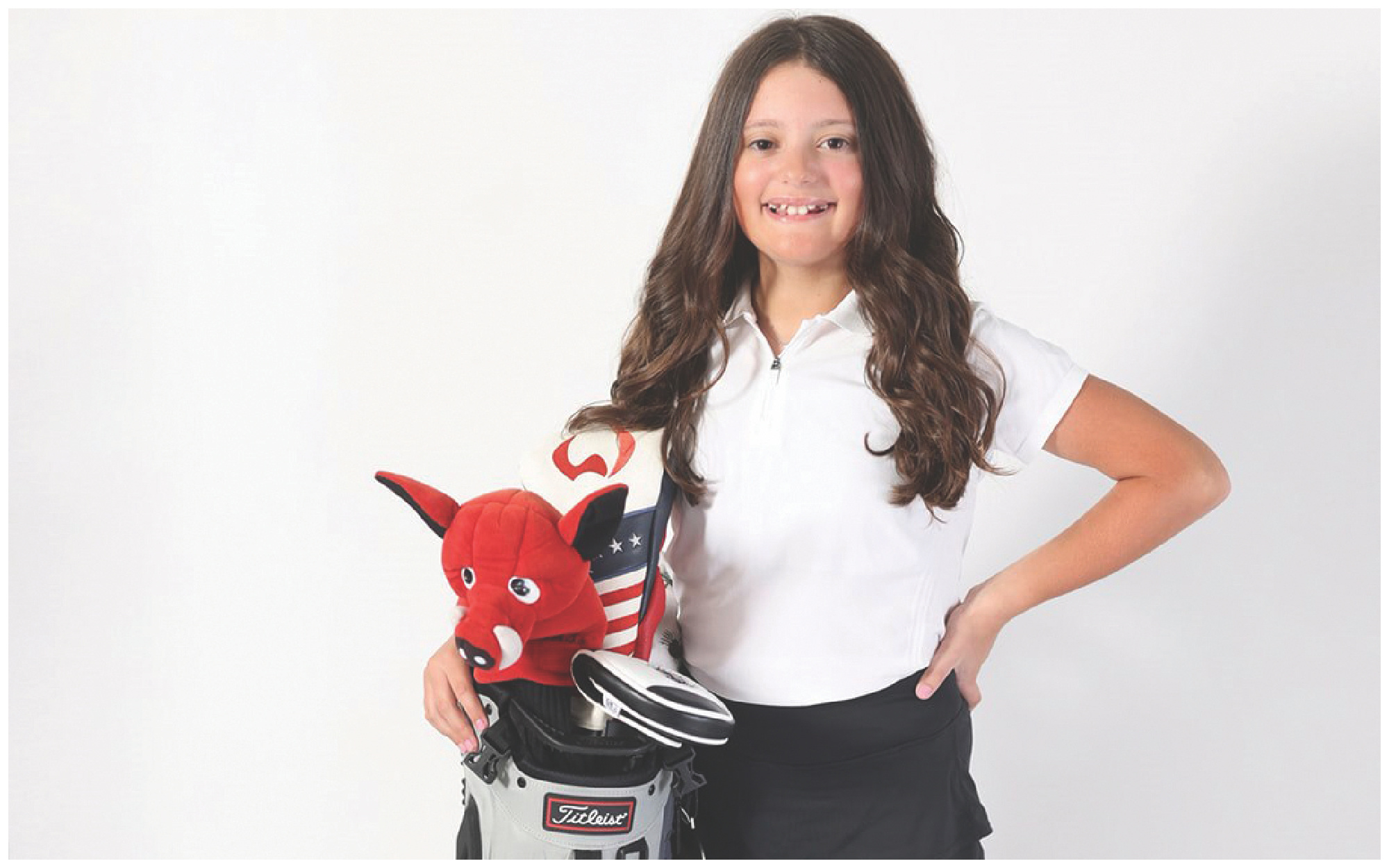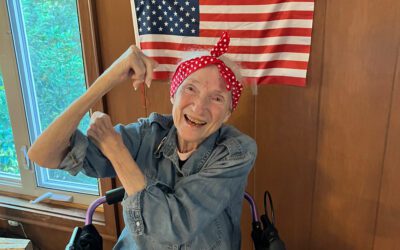There are a lot of things you don’t know when you’re ten years old. For Nora Shelor, one of the things that has yet to be revealed is that golf wasn’t meant to be as easy as she makes it look.
Nora, a fourth grader at Arkansas Connections Academy in Bentonville, began in sports as a gymnast at age four. When the pandemic forced her and her gymnastics peers to the sidelines, she began searching for something else to do.
“When COVID started, we weren’t allowed to go to the gym, so I tried golf because it was something outdoors and my dad plays golf a little bit,” she says. “He got me a set of clubs and we just started going out to the golf course.”
During this time Nora and her parents, Andrew and Casey Shelor, watched the documentary “The Short Game”about seven- and eight-year-old golfers competing in the 2012 U.S. Kids World Golf Championships. On the spot Nora told her parents she wanted to golf.
“We were scared to death for her,” Casey says. “We had to Google where junior golf tournaments were. We had literally no idea; she just watched this documentary about kid golfers going to the world championships and she said, ‘I want to be a tournament golfer.’ We finally found a league in Tulsa and two weeks later she was playing, and we were terrified she’d have no idea how to do it.”
“She was a very strong gymnast for her age, and it was clear early that she was very good at that,” Andrew says. “Honestly, golf was no different. I play golf recreationally, I’ve never played competitive golf, but you could tell when she picked up a golf club that it came natural to her to some degree.”
That “some degree” was championship caliber. Two weeks after taking up the game, Nora entered her first tournament and smoked the field by eight strokes. She’d wind up fourth in the world her first year, the same world championship tournament she’d seen in the documentary, then repeated that finish in her second year.
Last year, she was runner-up at the world championship, shooting a two-under par no less. It’s something she talks about as casually as discussing her favorite color yet in a manner that’s well beyond her years.
“I had a rough second day which did not help me,” she says. “I really had to play good on the last day to have any shot at being in the top five. I didn’t think I had made top five, I thought I had gotten sixth or seventh. So, I was really surprised whenever I saw my name in second.”
Nora comes by her athletic aptitude honestly as her mom was a gymnast and cheerleader and her dad was a collegiate baseball player. But when it comes to sports, neither Casey nor Andrew fit the part of the overzealous parents shoving their child into the spotlight. In fact, it’s quite the opposite at the Shelor household.
“Junior golf has the ability to be a mess, for lack of a better description,” Andrews says. “Parents can be terrible. Kids can develop really bad behavioral habits. It’s very tough. We have made a very conscious effort to say we will never ask her to practice. That is a hard, fast rule in our house. It’s super-easy to get caught up in this and for it to become your entire life.
“Our hard rule at home is we never play, we never practice, we never go to the golf course, we never do anything golf-related unless she asks. We don’t have a fixed, set schedule. None of that. We really let her drive when it comes to golf. It keeps it at zero pressure.”
Left up to her, however, Nora wants to play and that she does almost every day. After getting her feet wet with First Tee, a national organization designed to introduce youngsters to the game, she moved on to private coaching where she insists, she has to work just as hard as the next person to master the game.
“Chipping has definitely been the hardest thing for me to get good at,” she says. “It’s so hard to get the ball to go exactly where you need it to. It needs to be so close to the hole and it takes a lot of practice.
“Putting is so much easier than driving the ball because whenever you actually have to hit a tee shot, there’s so many little details that go into a swing. Putting, take it back a little bit and follow through.”
Nora’s sport of choice isn’t cheap; among equipment, lessons, travel, and tournament fees the family jokes about how many “very expensive golf vacations” they have taken together where only one of them is actually golfing.
“I am absolutely not a golfer. I do have a set of clubs that I’m pretty sure they got me out of pity last year. My entire set of clubs is probably cheaper than her driver; cheaper than her driver shaft, I’m guessing,” jokes Casey. “During the week, I am the one who takes her out and even though I’ve sat through thousands of dollars’ worth of lessons, she just laughs when I try to do any corrections at all. So, I just drive the cart.”
Casey may not be much use in the technical department, but one important element of Nora’s game in which both she and Andrew have been instrumental is in sportsmanship. Talking to Nora it is clear she has been well schooled on respecting her opponents and, win or lose, keeping the game in perspective.
“When you go to the world championships, you see how some of the parents and kids can get pretty crazy,” Casey says. “We pride ourselves on very much being the even keel family when emotions can be very high around us. She wins with grace, but she loses with even more. You don’t win every week. It’s just not going to happen. And there’s going to be days where people who have never beaten you before, they beat you. She is consistently complimented on her gracefulness.”
Case in point, every year Nora has played at the world championships, she’s been bested by Bella Simoes of Brazil. Some prodigies would seethe at the mere mention of a rival’s name, but Nora describes the champ as one of her good friends.
“Sometimes other people just play better than you,” she says. “If you have a bad round or a bad hole or something, it’s never going to be easy just to say, ‘Oh, I double-bogeyed this hole.’ But you have to move on and go play the next. It’s definitely something I’m still learning, but I’m getting better at it.”
“That’s her personality in a lot of life,” Andrew says. “She’s very even keel, very mild-mannered. She’s hyper-competitive and there’s nothing wrong with that, either. It’s very hard to manage emotions are up and down, up and down, up and down, even in a three-hour window. Her ability to stay calm is certainly something that helps her on the course.
“She’s really good and she knows she’s really good, which makes her want to go and win everything that she plays. But that’s not always reality, even when you’re great.”
Nora takes a similarly laid-back view of her future. She’s got some heroes in the game, namely Grace Kilcrease who plays for the University of Tulsa and Abby Schutte, a standout for the Arkansas Razorbacks. Nora says she might follow in their footsteps, or she might not; college is, after all, a long way away. For now, it’s enough to have something she can share with her family, make friends and see how good she can be.
“I want to do it just to have something that I can love for the rest of my life,” she says. “I think golf is fun because it’s just so much different than gymnastics. I like that it’s an individual sport and I love being able to play at these golf courses all around the world.”
Then, as if to make mere duffers feel better about themselves, she adds, “Golf’s really hard, actually.”
CALL OUT
Follow Nora on Instagram at NoraReeseGolf.




